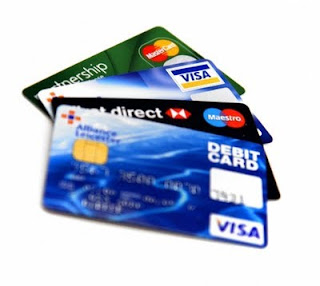
A question we are used to answering as we pay for our goods and services at coffee shops, grocery stores, barber shops and book stores. The assumption by retailers is that you will not be paying cash for your transaction, but rather that you will swipe either a credit card or a debit card tied to your bank account. With over $1.63 Trillion in debit card transactions in 2009 according to J. D. Power & Associates survey, compared to $20 billion in credit card transactions, Americans are saying "debit" more frequently.
With consumer spending dropping in the recent recession, so to has consumer debt. Seeing an increase in debit card usage and decline in credit card usage for purchases is not surprising as consumers begin to reign in buying "wants" and stick to "needs." Through all of these transactions is a myriad of companies and fees that scrape a little off the total bill of $43.56 you just paid at Trader Joe's to handle the transaction and make your check out so easy.
There are different fees for debit cards and credit cards and most retailers prefer the debit card transaction as it costs them less per transaction. With the rising numbers of debit card transactions, retailers are facing a choice, or have already slowly implemented their choice: raise prices or lower profit margins, because of the rising costs of doing business with a consumer that is moving away from cash. Years ago AM/PM made the move to give the consumer the choice: pay cash or pay $0.45 more on your transaction to use a credit or debit card. The choice most retailers are making has been an incremental increase in prices, a penny hear a nickel there to cover their increased operating expenses due to decreasing cash transactions.
When you swipe your card at the cash register the merchant pays a fee up to 2.95% of the total transaction cost plus a flat fee up to $0.15 (fifteen cents). Larger retailers such as Home Depot or Kroger's, have a better rate than smaller merchants that may have only one or two, or even ten, stores. The percentage rate can, and usually does, vary by the size of the transaction with the higher rate being for smaller purchases. A stand alone coffee shop with an average transaction of $4.32 will most likely pay the highest fees for offering the convenience of card transactions, using the $4.32 transaction up to $0.28 (6%) can be for fees so you can use your card. In addition to the swipe fee the retailer has standard bank fees for statements, transfers, etc.
Looking forward the retailers and banks realize that the use of debit cards for transactions are likely to increase as more and more consumers become used to using them, essentially as those who grow up with debit cards make them an integral part of their financial habits, just like on-line bill pay. Banks and Visa/MasterCard have been increasing their marketing to use debit cards because of the billions in fees collected by the use of these cards through the interchange rates per transaction. Retailers have been supporting their use to an extent, as banks have been raising their fees for debit cards the convenience offered customers balanced against the higher fees offset by a recession that makes raising prices very difficult, retailers are in a difficult financial position. Especially smaller retailers.
This huge financial industry that is integral to almost all of our lives now has a new factor with which to contend: politics. President Obama, Majority Leader Reid and Speaker Pelosi have found a silver lining in the Gulf oil disaster, it has completely obfuscated all news on their financial reform bills. As complex, confusing and disjointed as the health care reform act, the financial reforms coming out of yet another multi-thousand page bill have seen little scrutiny by the media. As a result most Americans are completely ignorant of many provisions that will impact their daily lives. In fact many industries are still trying to learn how they will be impacted if the bills are passed as they currently stand.
One aspect of the current bill in the Senate is to limit the fees that can be charged retailers for interchange fees. The purpose of this is, of course, to "protect the consumer." The principle being to limit the fees that banks and credit card companies can charge retailers will limit the charges passed onto consumers for debit charges through higher prices needed to off-set the bank fees. This works very well for the retailer and the large banks such as Chase and Bank of America, but not so well for many consumers and the smaller community banks and credit unions.
Under the proposal the government will set the interchange fees for debit and credit card purchases and the supposition is the fees will be much lower than they are today. Seeing the billions of dollars to the banking and credit card industry in these fees that ultimately are paid by consumers through prices at retailers, the politicians feel having government control of these fees will lower the costs to consumers by taking them out of bank profits. But like taxes, fees or inability to collect fees to maintain profit margins, are always passed along to consumers.
Small banks and credit unions are strongly opposed to the government intervention in the interchange fee market and especially forcing lower fees. They are communicating to their customers that such a reform will result in their having to raise their bank fees to depositors, and/or charge a fee for every debit transaction they process to individual accounts to make up for lost fees from retailers. They argue that retailers most likely will not lower their costs to make up for the lower fees imposed by the government, so in the end consumers will pay the same retail costs plus higher bank fees for the convenience of using debit cards.
Retailers, particularly small retailers, have long complained of the high costs of debit and credit card fees paid to banks, fees that have become increasingly more noticeable to them as the number of cashless transactions they process has risen. Banks count of the fees to ensure profitability, or at least lower operating costs; as has been seen in the past few years many banks are on the verge or have been past the verge of profitability. Caught in between, as always and as the market system is supposed to work, are the consumers. Choosing between quality, price and service consumers make their choices known by where they swipe their cards. With the pending legislation impacting bank fees consumers will then be faced with making their choices on which banks to use based on what charges will accrue to them for the convenience of using debit cards for their transactions.
Since 2007 we have heard "too big to fail" in many different ways. In looking ahead to the future for American consumers and their financial options, it appears Congress and the Administration would rather have a few very large banks, lets call them huge, versus an economy with many small community banks and credit unions serving local populations. By moving the charges to consumers for using debit cards from the retailers to the banks, the pending legislation will move consumers from smaller banks to larger banks that will be able to use economies of scale to offer lower fees to a larger customer base.
As a consumer that uses a debit card significantly more than cash for my purchases, I would much rather pay the retailer for any interchange fees as part of the price of the goods and services I am purchasing than have additional fees added to my monthly bank charges. For one in any given month I do not know how many such charges I will have making it difficult to properly budget these fees.
Do you use mostly cash or debit/credit cards for your everyday transactions? Would you rather pay for the convenience of these transactions at the cash register or through your bank fees? Click on "comments" below (itty-bitty next to "Posted by Dennis C Smith...") and let us know will you go back to cash or stick with debit card if fees change?
DCS06142010





2 comments:
It depends...on the size of the purchase, and the amount of the fee. Certainly there would be a threshold where I'd use more cash.
My recollection about the legislation you're describing is that it also would allow merchants to offer a discount for cash, something current bank rules prohibit. That is something that small businesses have been lobbying for.
Banks have a vested interest in encouraging us to use check cards. It's significantly less expensive for them to process electronic transactions than to accept and account for cash. So I think there will be at least some countervailing influences.
More needless government intervention into Americans' private and business lives.
Post a Comment